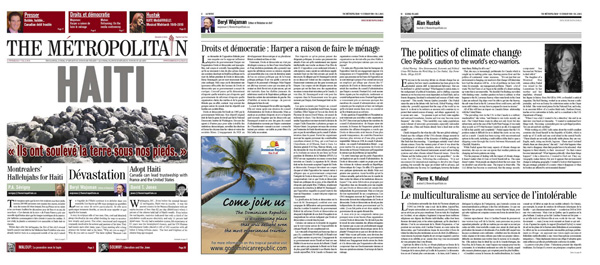Letters
Par readers le 11 février 2010
Profiling yes, but do it right...
Thanks for your courage...
Keep the articles coming...
La poussière sous le tapis
Par Pierre K. Malouf le 11 février 2010
 J’ai failli intituler cet article Mes prédictions pour l’année 2010. Je
me suis ravisé, car ma boule de cristal refuse de me révéler ce qui va
se passer cette année. Tout au plus me laisse-t-elle entrevoir ce qui
n’arrivera pas. J’ai dressé une liste de ces non-événements. Voici la
prédiction dont je suis le plus sûr : le gouvernement libéral dirigé
par Jean Charest ne prendra aucune décision douloureuse.
J’ai failli intituler cet article Mes prédictions pour l’année 2010. Je
me suis ravisé, car ma boule de cristal refuse de me révéler ce qui va
se passer cette année. Tout au plus me laisse-t-elle entrevoir ce qui
n’arrivera pas. J’ai dressé une liste de ces non-événements. Voici la
prédiction dont je suis le plus sûr : le gouvernement libéral dirigé
par Jean Charest ne prendra aucune décision douloureuse.
Attention : «douloureuse» n’est pas synonyme d’ «impopulaire». La
création d’une commission d’enquête sur la corruption dans l’industrie
de la construction serait accueillie favorablement par la population,
mais serait apparemment douloureuse pour M. Charest (je me demande
pourquoi).
Dévastation
Par Beryl Wajsman le 11 février 2010
La tragédie de l’Haïti continue à se déferler dans son ensemble. Les
leçons qu’elle nous enseigne au quotidien vont au cœur de notre
particularité. Si elle aura quelconque testament durable, ce sera de
nous rappeler ce que signifie être humain.
A story in scripture tells of two men. One, cool and detached, always
involved in his own affairs looking for ways to accumulate wealth and
power. The other, emotional and engaged, constantly involved in the
actions and passions of his time...
Montrealers’ Hallelujahs for Haiti
Par P.A. Sévigny le 11 février 2010
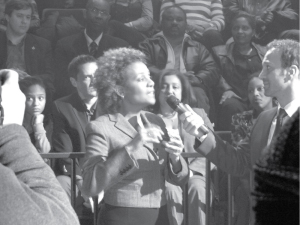 Trois semaines après que la terre s'est soulevée sous leurs pieds,
environ 200 000 personnes sont censées être mortes, écrasées sous des
tonnes de béton émietté. Port-au-Prince est en ruines et les survivants
fouillent les décombres pour de l'eau et un peu de nourriture. « Les
damnés de la terre » de Frantz Fanon a pris une nouvelle signification
alors que les images numériques de la catastrophe haïtienne
commençaient à faire chemin à travers les médias. À son crédit, la
planète a commencé à se rassembler et l'aide était en chemin...
Trois semaines après que la terre s'est soulevée sous leurs pieds,
environ 200 000 personnes sont censées être mortes, écrasées sous des
tonnes de béton émietté. Port-au-Prince est en ruines et les survivants
fouillent les décombres pour de l'eau et un peu de nourriture. « Les
damnés de la terre » de Frantz Fanon a pris une nouvelle signification
alors que les images numériques de la catastrophe haïtienne
commençaient à faire chemin à travers les médias. À son crédit, la
planète a commencé à se rassembler et l'aide était en chemin...
Droits et démocratie : Harper a raison de faire le ménage
Par Beryl Wajsman le 11 février 2010
Les demandes de l’opposition fédérale pour une enquête sur la supposé influence négative du gouvernement Harper sur l'organisation Droits et démocratie sont inacceptables, mal conçus et corrosifs. Inacceptables parce qu’ils ne résonnent à rien de plus qu'une chasse aux sorcières cherchant un bénéfice politique sur la mort du défunt président de Droits et démocratie, Rémy Beauregard; qui est mort récemment d'une crise cardiaque. Mal conçu car ils démontrent une ignorance effroyable des lacunes de Droits et démocratie que ce gouvernement a essayé de corriger...
Reframing: A comment on the media controversy surrounding Rights and Democracy
Par David Matas le 11 février 2010
Remy Beauregard, the former president of Rights and Democracy, died of a heart attack the night of January 7, 2010. Some of the staff of Rights and Democracy in the name of all of them released a letter dated January 11, 2010 calling on the leadership of the Board of Directors to resign, accusing them of harassment of the former president. The accusation of harassment was directed against the chair and vice-chair of the Board, Aurel Braun and Jacques Gauthier, and the chair of the audit and finance committee, Elliot Tepper...
Chill, political foodies! There’s too much government already
Par Lorne Gunter le 11 février 2010
One of the worst by-products -- among many -- of the rapid expansion of government in the past 50 years has been the politicization of everything, including aspects of personal daily life that government has no business in. Relationships, child rearing, garbage collection, even the replacement of light bulbs have come under government scrutiny..
Harper prorogues Parliamentary backhanding
Par Mischa Popoff le 11 février 2010
If Harper prorogued Parliament merely to avoid answering questions about Afghan detainees there might be a basis for the indignity the opposition feigns. But Harper had a quick look at the polls before he called G.G. Michel Jean and you can rest assured that the tale of a terrorist who claims to have been roughed up after our soldiers handed him to Afghan authorities is destined for obscurity...
Burqa tolerance points to a leadership vacuum
Par Dan Delmar le 11 février 2010
The lack of political courage across all levels of government and most political parties is nothing short of shameful. The burqa (or niqab) is possibly the most offensive garment on the face of the earth: A head-to-toe covering worn by women who practice an extremist and some say perverted form of Islam. It is a symbol of repression, misogyny and, as French president Nicholas Sarkozy said last year, “debasement.” It should not be tolerated in any civilized society...
Activists and diplomats unite to help Sun Youth’s Haitian relief
Par Alan Hustak le 11 février 2010
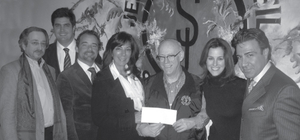 Sometimes tragedies do bring out the better angels of our nature. And
they bring together new allies in common cause to help those who are
always at the forefront of relieving human suffering.
Sometimes tragedies do bring out the better angels of our nature. And
they bring together new allies in common cause to help those who are
always at the forefront of relieving human suffering.
Much money has been raised for Haitian relief. World leaders meet at
conferences to discuss reconstruction. Great concerts are held. All
this is just and right.
Adopt Haiti
Par David T. Jones le 11 février 2010
Washington, DC…Even before the seminal January 12 earthquake, Haiti was in trouble. It was the poorest country in the Western Hemisphere with per capita income of less than $2 per day ($660/year) where 1 percent of the citizens held half of Haiti's wealth. Even before the earthquake, statistics indicated that only a third of the population could access electricity and only 11 percent had piped water. No city had a sanitation system; life expectancy at 61 years was the hemisphere's lowest, and the UN Human Development Index placed it 149 of 182 countries with all below it being African states. The best and brightest of its citizens long ago escaped...
Haiti can rise
Par Jessica Murphy le 11 février 2010
In 2006, Canadian-Haitian intellectual Georges Anglades penned the
tongue-in-cheek novella, 'What if Haiti declared war on the USA?'
It explored a Haiti so totally destroyed in a war against imperial
powers it's given a chance to climb out of three centuries of adversity
by starting from scratch.
Sadly, Anglades and his wife Mireille died in the January earthquake
that ravaged the country they loved and worked throughout their lives
to improve...
The politics of climate change
Par Alan Hustak le 11 février 2010
 Everyone in the non-stop debate on climate change has an opinion, but
how much consideration has been given to the potential seismic shift
in international diplomacy that can be attributed to global
warming? What happens to nation states, to the realignment of
political boundaries, and to shifting corporate interests as we become
even more dependent on fossil fuels, and as forests disappear, farmland
is exhausted and sources of fresh water evaporate?
Everyone in the non-stop debate on climate change has an opinion, but
how much consideration has been given to the potential seismic shift
in international diplomacy that can be attributed to global
warming? What happens to nation states, to the realignment of
political boundaries, and to shifting corporate interests as we become
even more dependent on fossil fuels, and as forests disappear, farmland
is exhausted and sources of fresh water evaporate?
Le multiculturalisme au service de l’intolérable
Par Pierre K. Malouf le 11 février 2010
La Déclaration universelle des droits de l’homme adoptée par l’ONU en 1948 fut mise à mal dès le début. Aujourd’hui, l’utopie universaliste est surtout menacée par l’islamisme, qui ne sévit pas qu’en pays musulman. Il est en train de s’implanter en Occident, où ses adeptes s’ingénient à imposer leurs traditions religieuses aux dépens des libertés individuelles, celles dont leurs femmes devraient jouir, et les nôtres également, qu’ils cherchent à détruire. C’est le cas notamment de la liberté d’expression. «C’est pourtant sur ces terres, écrit Caroline Fourest, au coeur même des démocraties, que l’universalisme risque de succomber à force de tolérer les idées les plus intolérantes au nom du droit à la différence.»
Time to shine the light on Uzbek sadism
Par Lauryn Oates le 11 février 2010
In the vast emptiness of the Kyzyl Kum desert that covers western
Uzbekistan, there is a dark prison called Jaslyk. The very name causes
local people to shudder. There, inmates are jammed into cells, 16 in
each, sometimes forced to stand for days on end, forbidden to speak out
loud.
One day in 2002, two men were being tortured in Jaslyk. Their names
were Muzafar Avazov and Khusnuddin Olimov. Submerged in boiling water,
they were literally boiled alive, a form of torture otherwise unknown
since the likes of 14th-century Scotland or the Roman Inquisition...
Piperberg's World
Par Roy Piperberg le 11 février 2010
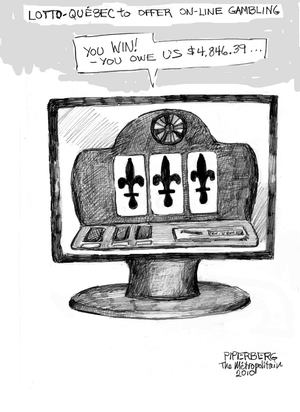
Bubble, Bubble…Canadian Debt Trouble
Par Robert Presser le 11 février 2010
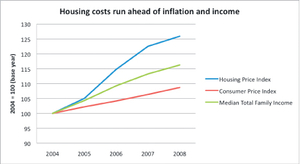 Canadians can rarely feel smug when comparing themselves to their US
neighbors, but when it comes to our banking sector our airs of
superiority are justified. While the Obama administration contemplates
an overhaul of financial industry regulation and punitive taxation of
banking executives’ bonuses, Prime Minister Harper announced in Davos
that Canada has no intention of “micro-managing” Canada’s banks.
Canadians can rarely feel smug when comparing themselves to their US
neighbors, but when it comes to our banking sector our airs of
superiority are justified. While the Obama administration contemplates
an overhaul of financial industry regulation and punitive taxation of
banking executives’ bonuses, Prime Minister Harper announced in Davos
that Canada has no intention of “micro-managing” Canada’s banks.
L’infrastructure numérique du XXIe siècle
Par Marc Garneau le 11 février 2010
Pendant et après la Seconde Guerre mondiale, C.D. Howe, un homme politique canadien, a présenté un grand projet de société pour transformer le Canada en une puissance industrielle de premier plan dans la seconde moitié du XXe siècle. Anticipant l'avenir, il a commencé à créer les industries nucléaire et aérospatiale du Canada, ainsi que l'infrastructure essentielle nécessaire pour bâtir une économie prospère et dynamique.
The CSST and workers rights
Par Jack Locke le 11 février 2010
One day, Bob Morgan was happily working at his baking job when he was
assaulted by a co-worker. The story is eerily reminiscent of the
butcher who had a mishap while grinding beef to make sausage.\
The butcher was a skilled fellow with many years experience under his
belt. As he was grinding the meat he realized he had to add more spices
to the mixture. As he reached high atop the shelf, the pepper fell.
When he tried to catch the falling container, he accidentally backed up
into the meat grinder...
Liberalism and the Jews
Par David Solway le 11 février 2010
One of the strangest and, at first blush, inexplicable aspects of the current social and political scene, remarked upon by many writers, is the swelling tide of antisemitic sentiment and the orchestrated, international campaign against the very existence of the Jewish state. We see it in the divestment campaigns of the churches, NGOs, and trade unions, in the proliferation of “Israel Apartheid Weeks” on university campuses, in the modern blood libel perpetrated by the Swedish press, and in the ramifying anti-Israel resolutions passed by the United Nations, exemplified most recently by the mendacious Goldstone report. Why should this be so?
Literary connections, plays about writers and writing hit the stage
Par Alidor Aucoin le 11 février 2010
 Imagine, if you will a shoot -out between two of North America’s most
famous French-Canadian word slingers, Michel Tremblay and Jack
Kerouac. George Rideout’s Michel & Ti-Jean, playing at the Centaur
until March 7, is an unexpected surprise, a daring, novel audacious
idea that actually works on stage. The encounter between the two takes
place in 1969, one month before Kerouac drank himself to death.
Tremblay, who was then 27 and anxious to validate himself as a writer,
hitchhikes to St. Petersburg, Fla., with a copy of his then as yet
unproduced play, Les Belles Soeurs in his knapsack to give to Kerouac
to read.
Imagine, if you will a shoot -out between two of North America’s most
famous French-Canadian word slingers, Michel Tremblay and Jack
Kerouac. George Rideout’s Michel & Ti-Jean, playing at the Centaur
until March 7, is an unexpected surprise, a daring, novel audacious
idea that actually works on stage. The encounter between the two takes
place in 1969, one month before Kerouac drank himself to death.
Tremblay, who was then 27 and anxious to validate himself as a writer,
hitchhikes to St. Petersburg, Fla., with a copy of his then as yet
unproduced play, Les Belles Soeurs in his knapsack to give to Kerouac
to read.
KATE McGARRIGLE: Musical Matriarch 1946-2010
Par Alan Hustak le 11 février 2010
 Kate McGarrigle was a free spirit who, with her much more restrained
sister, Anna, enchanted us with their unornamented, honey-voiced duets
in both official languges. Kate was the taller of the two, the
slightly off kilter one, tart and earthy, the one who took charge on
stage assuming everyone in the audience was a member of the family.
Kate McGarrigle was a free spirit who, with her much more restrained
sister, Anna, enchanted us with their unornamented, honey-voiced duets
in both official languges. Kate was the taller of the two, the
slightly off kilter one, tart and earthy, the one who took charge on
stage assuming everyone in the audience was a member of the family.

